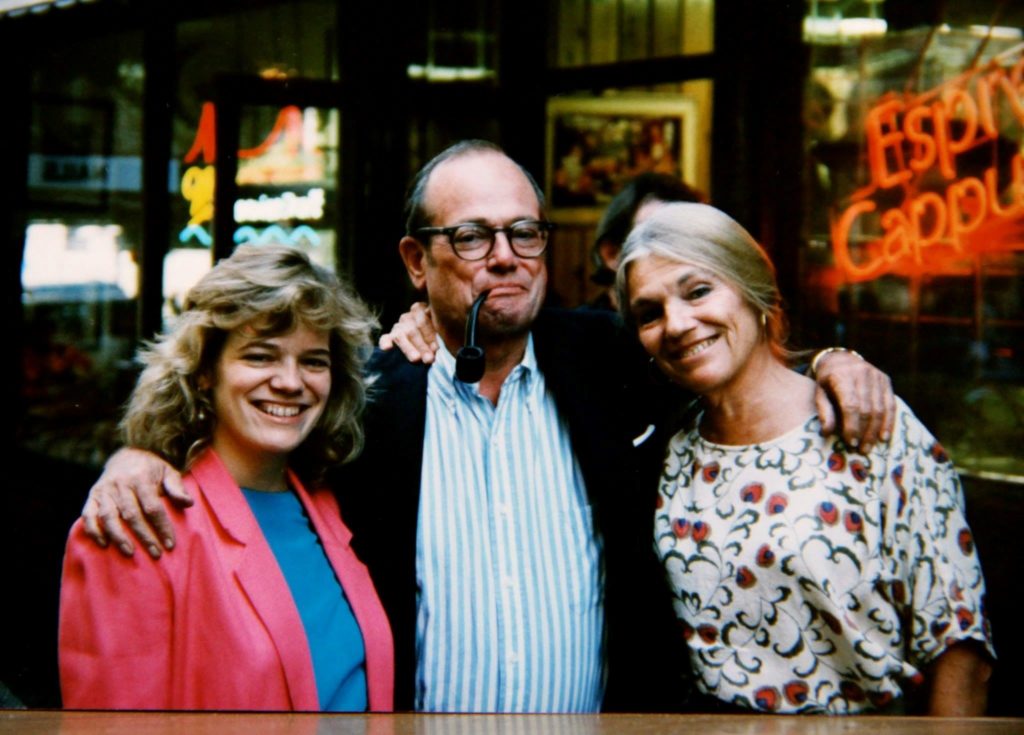On Faith and Friendship: Remembering Faith Abbott McFadden (1931-2011)
God blessed my life with the friendship of an extraordinary woman, Faith Abbott McFadden. Many readers of the Human Life Review remember Faith as a senior editor and the wife of HLR founder, James P. McFadden. She was also the mother of five, including the Review’s present editor, Maria McFadden Maffucci.
Faith and I had an actual mailbox-to-mailbox correspondence which began in 1989 and continued until her death from cancer in 2011. We exchanged opinions on current events, raising children, and life in general. She was insightful, funny, brilliant, and ever-thoughtful of others.
Faith also had a strong devotion to the saints. If she were writing to me on one of their feast days, she noted it under the date of the letter. So when I went to New York to visit her a couple of weeks before she died, I brought her some holy water from the Shrine of Saint Elizabeth Ann Seton, a beautiful place in Emmitsburg, Maryland, not far from where I live. And since Faith was a Manhattanite—as was St. Elizabeth Ann Seton in her early days—and I was a Marylander—as was the saint in her latter days—I sensed a connection that compelled me to bear water from that shrine to Faith’s Park Avenue apartment.
But it’s in the spirit of another saint that I’d like to dedicate this post today remembering my faithful correspondent, Faith.
Saint Faith of Agen, Feast Day October 6
The name “Faith” is blessed in so many ways. To have faith is to be confident in Truth, despite the denials of all around us. It’s to overcome adversity and to “be not afraid.” It means to “be of good cheer” when you’re surrounded by nothing but doom and gloom.
But few are aware that there exists in the martyrologies a person actually known as Saint Faith, or in the Old French, Sainte Foy d’Agen. October 6 is her feast day. Her reliquary is in the Church of Saint Faith in Conques, France, and there is another Catholic church dedicated to her in Selestat, in the Alsace region.
According to Butler’s “Lives of the Saints,” the young Saint Faith was martyred in the early fourth century during the persecutions of Christians under the Roman emperor Diocletian. When apprehended, she was brought before Dacian, the prefect of Gaul. When Dacian asked what her name was, she replied: “My name is Faith, and I endeavor to support in reality what that name signifies.”
Saint Faith’s refusal to renounce Christ and perform sacrifices to pagan gods got her tortured and killed. And that’s what true martyrdom is about, really: refusing to bow down to idolatry under pain of punishment, even death. It means holding fast to Faith.
Fast forward to the 21st century, and an old French adage rings truer than ever: “Plus ça change, plus c’est la même chose.” My favorite translation is this: “The more things ‘change,’ the more you get same old, same old, same old.” Indeed, as we witness the lightening erosion of religious liberty in today’s transformed America, we are increasingly facing the same choice as Saint Faith and all the saints: true worship or idolatry? God or mammon?
And so it now happens that if a business doesn’t bow down in front of the altar of Planned Parenthood, it is threatened with ruin. If you “mis-gender” a person in New York City, you can face a $250,000 fine, enough to wipe out the livelihood of the vast majority of people. If you don’t bow down to the notion of same-sex marriage, you can lose your business and life savings. Such tests are real and becoming more frequent. Where does such persecution—in the name of compassion (i.e., “anti-discrimination”)—end? As Flannery O’Connor noted, it leads to the same place that all compassion-devoid-of-truth leads: the gas chambers.
Such are the things my friend Faith and I reflected on. I can hear her adding a stoic “Natch” to all of the above. I believe her outreach to me—and to everyone—was built on her understanding that God leads us to do his work through friendship, through one-on-one personal relationships, influencing the lives of others as well as our own.
The massive impact of one life on another
Faith was a mentor, an advisor, a cheerleader, a life changer, an inspiration to me. I still fall short whenever I try to express the impact her letters had—and continue to have—on my life. And why wouldn’t I fall short? Why wouldn’t anyone who ponders the influence of another person on their life fall short in sizing it up?
I think the answer lies in the eternal mystery of love and the limitless trajectories a life can take. It lies in the fact that every human life is an entire universe of God’s making. There is just no way that the effect of one life upon another can be measured or predicted. We each play an incalculable role in human history, no matter how the worth of one person’s life may appear to another.
Human Life Review’s managing editor Anne Conlon reflected on this recently when she quoted the late Congressman Henry Hyde’s words on the impact of abortion:
“Have you ever thought that when an abortion occurs, you foreclose the future? Generations yet unborn are foreclosed; they’re stopped. So not only this life is taken, but all the succeeding lives that might well have been generated from that person.”
Faith grasped Congressman Hyde’s profound insight very well. But I can imagine her adding “if it can be grasped at all.”
I plan to write more about this extraordinary woman. But it is a challenge. My box of correspondence from Faith is like a major time capsule that covered an astonishing era: five presidential elections; the 1993 bombing of the World Trade Center and the 9/11 attacks eight years later; the deaths of both Princess Diana and Mother Teresa in the same week; the Clarence Thomas hearings; the impeachment of Bill Clinton, the pontificates of now-Saint John Paul II and Pope Benedict; the life and death of her friends, including Malcolm Muggeridge, John Cardinal O’Connor and William F. Buckley; the death of President Reagan; the Nancy Cruzan and Terry Schiavo euthanasia cases; the election of Barack Obama.
And throughout Faith’s hundreds of single-spaced typed yellow pages were personal reminiscences, news, and events—including marriages of her children, the arrival of grandchildren, and the 1995 publication of her memoir, Acts of Faith. All of this Faith generously shared with me, recounting precious anecdotes, often accompanied with photos.
There was also unimaginable grief. Faith and Jim endured the tragic death of their firstborn, Robert, from cancer at age 34, on December 28, 1994, the Feast of the Holy Innocents. Four years later, Jim died suddenly after a six-year fight with cancer. Though his illness left him unable to eat or drink or speak, Faith described to me how Jim persevered and vicariously enjoyed food. How? By cooking up a storm for her every night.
I hope to compose a fuller tribute to Faith in the future. In the meantime, I pray for her today—on the Feast of Saint Faith—and always.













Pingback: On Friendship, Faith, and Martyrdom